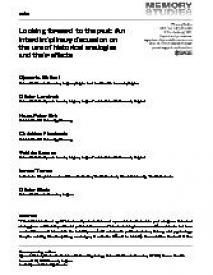Looking forward to the past : An interdisciplinary discussion on the use of historical analogies and their effects
Abstract
“This is Munich all over again!”: Such comparisons between a present situation and a past one (i.e. a historical analogy) are common in public and political discourses. Historical analogies were used for centuries but have received increased interest in the last 50 years from scholars in political science, history, and psychology.
Despite existing interdisciplinary exchanges, it remains difficult to identify the variables involved in the phenomenon as different methodologies and conceptualizations are used. Hence, we review part of this voluminous literature and suggest that the various effects related to the use of historical analogies can be grouped under four independent and non-mutually exclusive categories: representing a current situation, defining the roles of current actors, making decisions, and persuading others of a message.
We conclude by acknowledging the limits of this current conceptualization and emphasizing its potential as a useful heuristic tool to organize findings in a way that makes them readable across various fields.
Geachte bezoeker,
De informatie die u nu opvraagt, kan door psychotraumanet niet aan u worden getoond. Dit kan verschillende redenen hebben,
waarvan (bescherming van het) auteursrecht de meeste voorkomende is. Wanneer het mogelijk is om u door te verwijzen naar de bron
van deze informatie, dan ziet u hier onder een link naar die plek.
Als er geen link staat, kunt u contact opnemen met de bibliotheek,
die u verder op weg kan helpen.
Met vriendelijke groet,
Het psychotraumanet-team.
In: Memory Studies, ISSN 1750-6980 ; eISSN 1750-6999 | 10 | 3 | 274–285
https://doi.org/10.1177/1750698017701609


